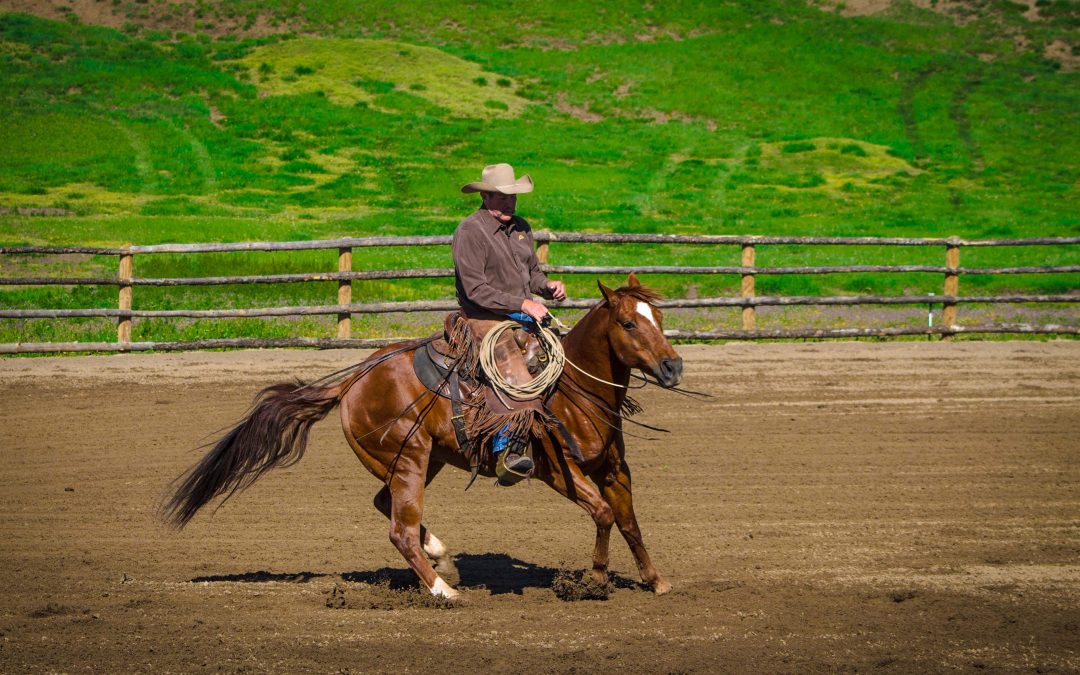Horse lovers worldwide agree that the quality of your horse’s foundational training directly attributes to your success with horses. The development of a strong foundation in horsemanship depend on these four key learning areas:
- Ground Exercises
- Arena Exercises
- Outside Riding & Living
- Purpose
In this third installment in this series, we will be focusing on step 2 of the 4 Step approach to a strong Foundation with your horse.
The Arena Exercises
Before we get on a horse’s back we establish a clear communication through a series of ground exercises. This is a powerful way of developing a strong relationship between the human and horse. Before moving onto arena exercises it is essential for us to have developed cooperation and leadership with our horses on the ground first.
To develop that trust we earned with our horses on the ground, we begin riding them in the safety of a small arena or round pen. Arena exercises allow you to connect what you did on the ground via halter and lead rope, to do the exact same thing except now from the top of the horse’s back. In the beginning, the smaller the arena or round pen, the safer you’ll be (consider this your classroom), as you and your horse get more confident the arena will gradually get bigger.
When you begin the arena exercises you’ll practise step by step strategies to make sure the horse can follow a feel, yield his hindquarters, and understand to move his front legs, just like you practiced on the ground. At this second stage of foundation training, we will get you to be proficient at a series of sequential exercises, such as follow a rail, bow tie, figure of eight, question box, and many more. It’s not going to be award-winning riding, but it is about building a language of foundation that will lay the platform so that one day, when your horse is ready, you can achieve your goals.
Arena exercises are an important part of building upon and nurturing your relationship with your horse. Arena training will allow positive patterns to develop between human and horse and you must never separate the two. Just like in any troubled relationship between humans, both parties will seek help, understanding and support. Yet, in years gone by we’ve tended to treat those horse/human relationships this way, sending the horse off to the trainer to fix. The trainer will get them going but when the horse is handed back to us we need to understand what the horse’s learned and why. Without that knowledge or understanding it will unravel all over again.
In the safety of an arena we build a language which is to communicate to our horse to go, to stop, to turn, speed up, to slow, and ‘what to do’ if it goes wrong, then know what is needed to help the horse find relaxation again. This stage of the foundational training is a big step from ground work.
These exercises allows us to learn as ‘rider – guider’ how to become a good leader when in the saddle!
A substantial part of this training will be to further develop in you an independant, strong and stable seat whilst on the back of a horse,
With the security and confidence of strong riding skills you are now prepared to manage their emotions and movement whilst at the same time managing your own emotions when and if your horse gets scared, confused or defiant whilst being ridden.
As a result of these arena exercises, both you and your horse’s skills and confidence grow as a result of learning how to navigate through narrow gaps and obstacles, you begin to mentally and emotionally prepare both you and your horse for ridden life outside of the arena.
In the next article we’ll talk about how we build upon ground and arena exercises to progress to the third step which is outside riding. A strong foundation is the key to success in all equestrian endeavours, whether your purpose is; dressage, show jumping, eventing, campdrafting, polo cross or having a relaxing and enjoyable trail ride. Your investment of time in your horse’s foundation will definitely pay off!
To see how you can gain more fun and enjoyment with your horse, and expose yourself to cutting edge horse behaviour and training strategies contact the Parelli Centre Australia on 02 4630 9677 to learn more about upcoming demos, 2 day Clinics, 5 Day Courses and Workshops.
By Neil Pye


